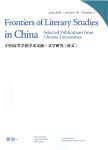Li Ruqian, the Lu Xun of the Nineteenth Century
Li Ruqian, the Lu Xun of the Nineteenth Century作者机构:Department of Asian Studies Vancouver Campus University of British ColumbiaVancouver BC Canada V6T 1Z2
出 版 物:《Frontiers of Literary Studies in China-Selected Publications from Chinese Universities》 (中国高等学校学术文摘·文学研究(英文版))
年 卷 期:2018年第12卷第2期
页 面:217-253页
学科分类:0501[文学-中国语言文学] 0303[法学-社会学] 0502[文学-外国语言文学] 05[文学] 0503[文学-新闻传播学]
主 题:Li Ruqian Zheng Zhen Shatan Group George Washington Lu Xun Chinese centrality doubting of tradition reform
摘 要:This paper discusses the biography, thought, and works of Li Ruqian (1852-19o9). He was appointed Consul in Kobe 1882-84, during which period he studied the political institutions and culture of Meiji Japan and the West, eventually translating Washington Irving's biography of George Washington into Classical Chinese, a book which exercised a great influence on late Qing reformers. Li's literary theory strongly emphasized the importance of originality. He also cultivated a style that was simpler and closer to spoken Chinese than many of his contemporaries. He eventually espoused a thoroughgoing reform of Chinese government and society. He abandoned the idea of the centrality of Chinese culture for a worldview of cultural relativity in which all cultures of the world are viewed as equally valid. After his return to China Li became even more involved in reform activities, but soon he became almost totally alienated from Chinese society and even began expressing strong doubts about the whole tradition of classical writing. In his poems and prose works, he warned Chinese intellectuals to abandon their smug conservatism and adapt to the new world or perish, making fun of his own society in biting satirical pieces that remind one of the writings of Lu Xun's May Fourth era. Li Ruqian may, indeed, be the first Chinese author to develop the idea of Chinese inadequacy and guilt which is so common in the literature of the next century.



